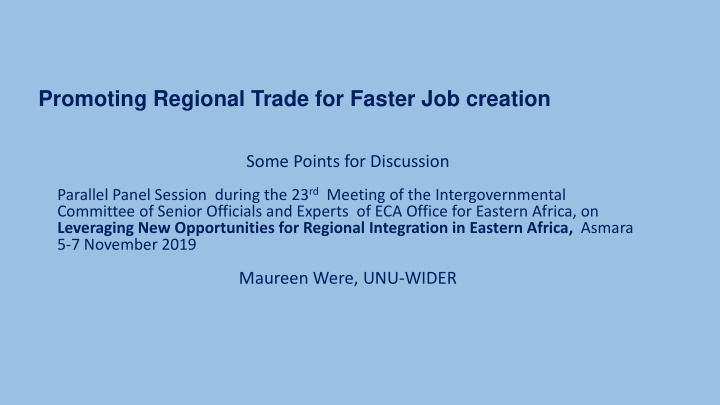



Promoting Regional Trade for Faster Job creation Some Points for Discussion Parallel Panel Session during the 23 rd Meeting of the Intergovernmental Committee of Senior Officials and Experts of ECA Office for Eastern Africa, on Leveraging New Opportunities for Regional Integration in Eastern Africa, Asmara 5-7 November 2019 Maureen Were, UNU-WIDER
Why Job Creation? • According to UNCTAD Economic Development in Africa Report 2018, Africa’s population estimated at 1.2 billion in 2017 is projected to double to 2.5 billion in 2050 − Consists of a significant share of youthful population (15-24 years), which projected to double to 461 million 2050 − Rapidly growing labourforce • Notable economic growth rates (Eastern Africa fastest growing region in Africa at average of 6.6 % between 2014-2018 ) has not translated to significant job creation − Unemployment rates still relatively high – recorded employment growth largely in informal sector or survivalist activities • Poverty is still widespread- low rates of poverty reduction compared to countries like China • Illegal immigrants and the Africans who die across the Mediterranean sea in desperation to cross to Europe for better opportunities
Trade integration has a significant role to play To create jobs the economies must grow, expand the production of • value-adding activities to absorb the growing labourforce and youthful population by leveraging on trade opportunities Regional trade provides an venue for job creation and realization of • Africa’s industrialization dream Close the trade deficits associated food imports, manufactured goods etc. • through regional and global value-chains African Continental Free Trade Area (AfCFTA) as a vehicle for investment •
Challenges Increased competition from cheap imports particularly from China • and the global economy Limited intra-trade compared to other regions in the world • Share of Africa’s trade in the world market still relatively low, more • so for commercial services exports at approximately 2 percent. Africa is one big continent but highly fragmented • Poor interconnectivity across Africa a major constraint • Protectionist regulatory policies and NTBs • Multiple membership to different regional groupings/RECs •
Policy measures to maximize job creation potential • Africa countries must learn and commit to trade with each other in atmosphere devoid of mistrust and supported by strong political will • Regional integration one avenue of addressing Africa’s fragmented markets and creating a niche in the global market- numbers matter but a unified effort and voice matter too for a greater impact! • Align the sub-regional groupings (EAC, SADC, COMESA etc) to AfCFTA • Higher competitiveness and efficiency- lower costs of doing business • Exploit the cheap abundant labour by investing in labour-intensive sectors, and regional and global value-chains • Active engagement and enabling environment to enhance role of private sector
….measures to maximize job creation….. • Investment in infrastructure to unlock supply-side constraints and transportation bottlenecks • Huge unexploited potential in services trade − Increase competitiveness in traditional services, exploit Africa’s diverse geographical nature and rich culture to expand tourism exports − Explore opportunities in modern services (financial, business and professional, telecommunication services, among others) • Enhance connectivity across Africa − Single African Air Transport Market (SAATM) − Joint/regional infrastructure projects (roads, railway, ports) • Easy movement of Africans across Africa – no visas! • Compliance with agreed upon commitments • Embrace digital/e-commerce • Skill upgrading
Thank you!
Ne Neglig igib ible le USD Million Share to SSA Share to World mark rket s shar are 2005-2010 2011-2016 2005-2010 2011-2016 2005-2010 2011-2016 South Africa 13,491 15,940 34.69 27.68 0.40 0.34 of of S SSA Kenya 2,279 3,852 5.86 6.69 0.07 0.08 Ghana 1,394 3,580 3.59 6.22 0.04 0.08 servic ices s Tanzania 1,713 3,084 4.41 5.36 0.05 0.07 Mauritius 2,145 3,012 5.52 5.23 0.06 0.06 ex exports Ethiopia 1,297 2,723 3.34 4.73 0.04 0.06 Nigeria 1,800 2,293 4.63 3.98 0.05 0.05 Uganda 670 1,805 1.72 3.13 0.02 0.04 Botswana 807 1,216 2.08 2.11 0.02 0.03 Madagascar 805 1,208 2.07 2.10 0.02 0.03 Sudan 288 1,133 0.74 1.97 0.01 0.02 Senegal 914 1,094 2.35 1.90 0.03 0.02 Zambia 573 835 1.47 1.45 0.02 0.02 Côte d'Ivoire 921 782 2.37 1.36 0.03 0.02 Seychelles 423 750 1.09 1.30 0.01 0.02 Namibia 543 729 1.40 1.27 0.02 0.02 Mozambique 394 615 1.01 1.07 0.01 0.01 Cabo Verde 439 576 1.13 1.00 0.01 0.01 Togo 218 445 0.56 0.77 0.01 0.01 Rwanda 219 441 0.56 0.77 0.01 0.01 Mali 340 383 0.87 0.67 0.01 0.01 Zimbabwe 264 329 0.68 0.57 0.01 0.01 Sierra Leone 63 204 0.16 0.35 0.00 0.00 Djibouti 118 183 0.30 0.32 0.00 0.00 Liberia 124 166 0.32 0.29 0.00 0.00 Niger 99 158 0.25 0.27 0.00 0.00 The Gambia 109 142 0.28 0.25 0.00 0.00 Swaziland 275 105 0.71 0.18 0.01 0.00 Malawi 70 102 0.18 0.18 0.00 0.00 Comoros 49 71 0.13 0.12 0.00 0.00 Sao Tome 9 50 0.02 0.09 0.00 0.00 Lesotho 38 39 0.10 0.07 0.00 0.00 Guinea-Bissau 27 34 0.07 0.06 0.00 0.00 Burundi 5 21 0.01 0.04 0.00 0.00 SSA 38,885 57,583 84.7 83.5 0.97 1.01 World 3,396,841 4,740,056 1.14* 1.21*
SSA Countries Ranking Trade Tourism Competitiveness Index 2019
Source: UNCTAD Economic Development in Africa Report 2018
Recommend
More recommend